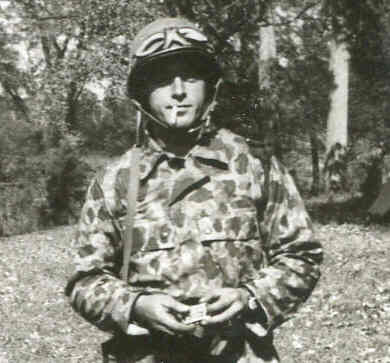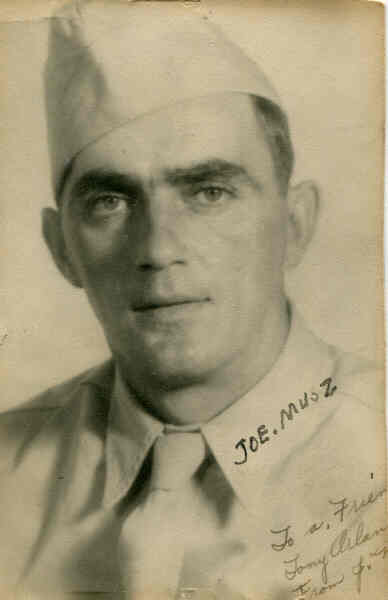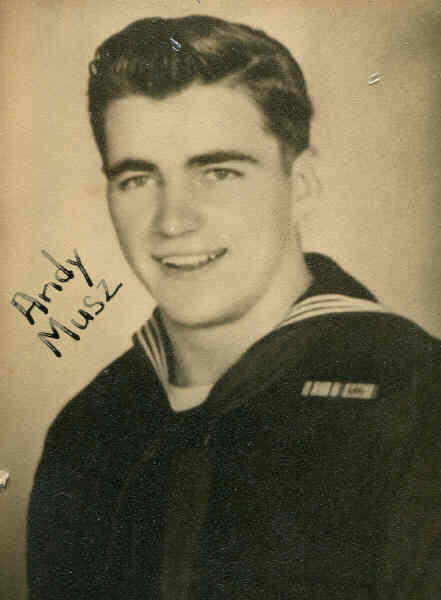'
Anthony Musz
A Soldier's Scrapbook and Letters Tell His Story |
 |
Anthony Musz (1918 – 1986) whose home was located at 20 Gaston Avenue in Raritan,
seldom spoke of his experience in World War II.
His daughters Cindy and Cathy only knew that his job during the war was to bring equipment to the front line troops.
They remember that a parachute was stored in their attic. Dad related that the parachute was used to air lift supplies to the front line troops and be dropped by
parachute to the soldiers below.
Like many of his contemporaries, Anthony said very little about his war experiences to his family. Upon his passing in 1986, it was assumed that the details of his war experiences would never be known. |
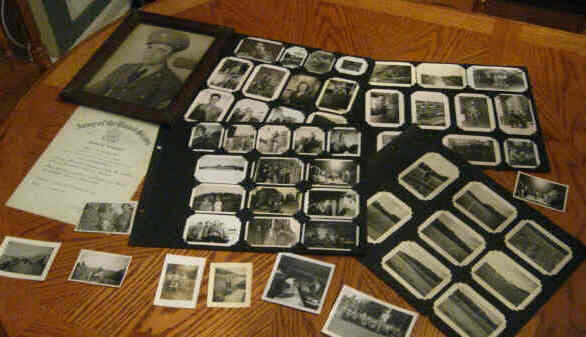 |
Recently, two sources of information have come to light to tell the story of his war time experiences.
First, a long forgotten scrapbook was discovered in the attic by his daughters. In addition, seventeen letters written to Raritan tavern owner Tony Orlando
during the war were made public by the Orlando family. Anthony did not leave much of an oral history of his war time service, instead he authored an extensive
scrapbook that documented his many travels and experiences. In the scrapbook are dozens of photos, each with notes on the back listing the location,
date, and names of those in the photos.
Through these silent records, an intimate portrait of Anthony’s war time experience emerges.
His discharge papers show that he entered the service in March of 1942 - just 3 months after the attack on Pearl Harbor. He trained state side for
21 months before being shipped out to England in January of 1944.
|
|
Click to read Anthony Musz's Letters That He Wrote Home During World War II |
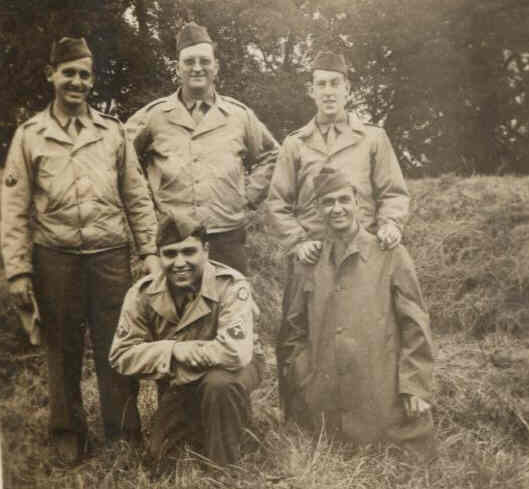 |
The photos taken while he was stationed in England in early 1944 show that it was an orderly,
relatively stress free time in preparation for the invasion of Fortress Europe. Many soldier’s recollections from this period were that it was a period of
calm with a normal daily routine. The German air raids on England had been greatly reduced since the Battle of Britain in 1940 and 1941.
During furloughs, the GI’s visited the countryside and met the British girls who were generally receptive to the Americans as their men were gone into active service.
A famous phrase from that time sums it up: “Oversexed, overpaid, and over here”.
Scrapbook photos from this time show Anthony and several friends hanging out, relaxed, and enjoying life while waiting for the upcoming invasion.
The letters Anthony wrote home at the time always mentioned Raritan and his family and how he thought about them a lot.
|
|
|
He also wrote Tony Orlando that he had often corresponded with his Raritan buddy Frank Zanetti and his brothers Joe and Mike.
(Anthony’s three brothers, Mike, Joe, and Andy also served overseas in World War II.) Anthony even managed to meet up with his brother Mike a few times in Europe.
Often it took creative ways to meet. Once a trip on “trash detail” put him close enough to his brother to be able to stop and visit.
Another time Anthony was able to meet up with a Raritan guy who lived on the same street as him in Raritan.
He wrote “I met Andy Sabol who lives but seven houses away and did we rave about the old town.”
|
| Anthony's Brother's Mike, Joe, and Andy |
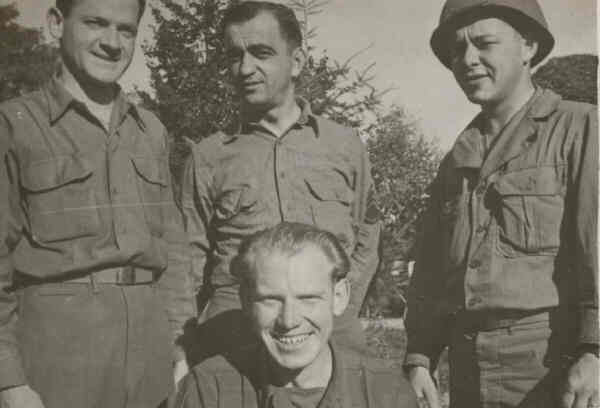 |
Like so many GI’s stationed overseas, he cherished the hometown newspapers that were mailed to him. He followed the stories of the Raritan guys who were MIA. Every newspaper was read and re-read giving a sense of home and loved ones so far away. He wrote in January of 1945 “A copy of The Messenger Gazette dated 15th of June came today and I still enjoy reading it.”
Anthony expressed how proud he was of the bravery exhibited by some of the hometown boys, stating “Say that Johnny Soriano is a real hero too for he’s doing a swell job out there in the Pacific. … With guys like him and Basilone around, we’ll have little trouble winning this crazy war.”
Anthony and his unit then shipped out from England to France. Dates on the photos in the scrapbook show that while he did not storm the beaches on D-Day, his unit would soon connect with the advancing Allied forces. By October of 1944, his unit would continue to move through France getting close to the German border.
|
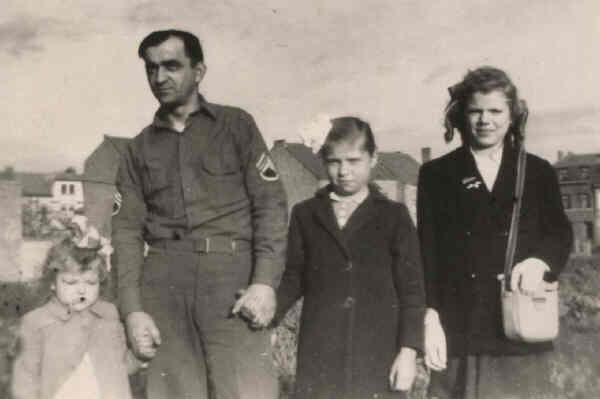 |
In November of 1944, the U.S. forces would move out of France into Belgium liberating them from the oppression
of the German occupation. The Belgium people were extremely grateful to the U.S. soldiers who had liberated them. Many GI’s became close friends with Belgium families
when the U.S. Army paused in Belgium to regroup. Anthony became close friends with the Estievenart family in Jambes, Belgium. Several photos show Anthony with
the Estievenart family who have four daughters. In many of these photos he is embracing or holding hands with the daughters. War time has often united people of
various backgrounds in a common cause to defeat evil. Here a twenty seven year old GI from Raritan, New Jersey, became good friends with a family who live
thousands of miles away in a small town in Belgium.
In his letters, Anthony always calls the mom of Estievenart family his “laundry lady” as she did all his wash for free. However, she and her family
were much more than that as he wrote “ I’ve been spending most of my time at my laundry lady’s home. There I learn a little French, get a midnight snack,
and stay with four lovely girls.”
|
Anthony with Jacqueline, Susan, & Christianne Estievenart
Jambes, Belgium Nov. 19th 1944 |
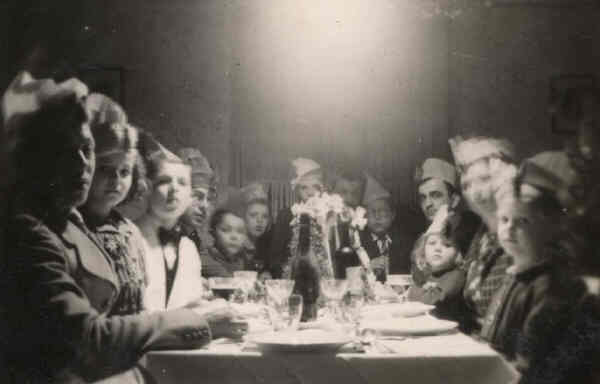 |
On December 17th 1944, the Germans began an all out counterattack known as The Battle of the Bulge.
The Germans launched a savage attack through the Ardennes forest in sub zero weather that pushed the U.S. Army backward.
Anthony wrote home at the time stating “A bit rough here but then we don’t mind as long as it brings the war to an end soon. Things don’t look good for Christmas.”
He went on to say how the Estievenart family was evacuated from their town when the Germans counterattacked.
By the beginning of January 1945, the U.S. forces had regrouped, fought back effectively, and pushed the Germans out of Belgium.
Thankfully, the Estievenarts returned to their home a little after Christmas and had a joyous celebration.
There are several photos of Anthony and the Estievenarts labeled “Christmas dinner with the Estievenarts “.
The date listed was January 6th 1945. The pictures speak for themselves. |
| Christmas Dinner with The Estievenarts |
Click for More Christmas photos from Belgium |
 |
Anthony’s bond with the Estievenarts was extensive. He wrote that they threw him a birthday party.
At the party, he celebrated a little too much writing “ I really got in the bag.” The mom even knitted him a bathing suit for him to swim in the Meuse River.
When it came time to leave Belgium he wrote “Had some swell times on the continent …
I am glad I had some pictures taken for it. … going to miss my laundry lady most of all.
I wrote a nice long letter telling her how grateful I am for her doing all my laundry and other things.”
Photos in the album show that after the war, Anthony would remain in touch with the Estievenart family.
There are photos of the four daughters the late 1940s. Whether Anthony visited them or they mailed him the photos is not clear.
Some photos in his album show that Anthony did indeed visit Europe in the late 1940s.
But the photos of the girls from the late 1940s are without him in it and in one photo the youngest girl is waving as if to say hello.
This author has attempted to contact the Estievenart family in Belgium to see if any of the girls are alive today. An Internet directory listing for Belgium shows that there are two families with that last name in the town of Jambes today. Letters were mailed, but no response has yet been received.
|
| Click for Full Photo |
 |
The scrapbook has a picture dated January 1945 that really stood out.
The photo shows Anthony dressed for the snowy conditions of Belgium at the time.
For students of World War II, the photo of him with the long heavy coat, boots, battle helmet, with the snow on the ground is instantly recognizable from the Battle of The Bulge in Belgium.
|
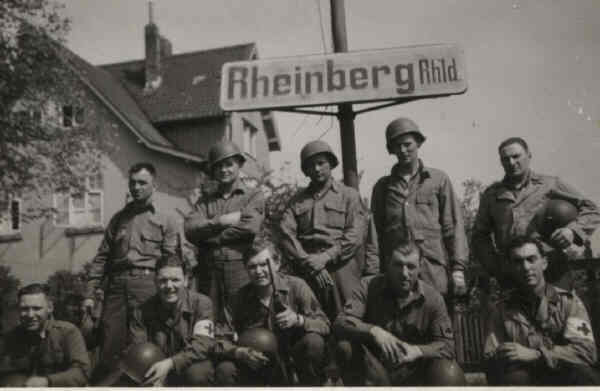 |
In April of 1945, Anthony and his unit were advancing into Germany. One photo shows a damaged German building that was adopted for their headquarters. Another one shows Anthony and eight others with a sign post saying Rheinberg (a city in Germany). A letter he wrote during this time tells that his duties were to help set up a POW camp for the Germans that had surrendered toward the end of the war.
In September of 1945, the war had ended and Anthony was again stationed in Belgium. He was granted a seven day leave to visit the boardwalk area of the Riviera in the city of Nice, France. Picturesque photos are found of the water front area and of Anthony on the beach. Vacation time was indeed earned after years of war.
|
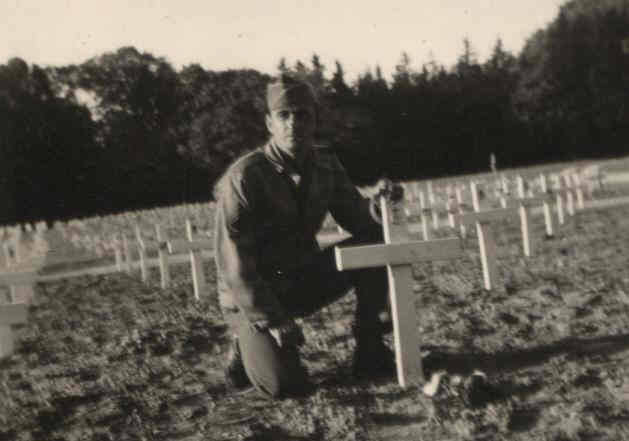 |
Before returning home from Europe, one photo shows him at an allied cemetery in Luxemburg.
There he visited the grave of fellow Raritan soldier Peter Petras.
In one of his letters, he tells how it took some persistence in getting to this cemetery.
On one attempted trip to the gravesite the pilot could not land as the local airstrip was out of commission.
But in a follow up letter, he tells that he finally got to the cemetery and had a picture taken of him at the gravesite. He sent this picture to the Petras family.
|
 |
Remarkably, the photos in his scrapbook even document his trip home.
He wrote on the front of the picture of his transport ship “Going Home Nov 25th, 1945.”
Click to see his Discharge Papers - this contains details on his service record
|
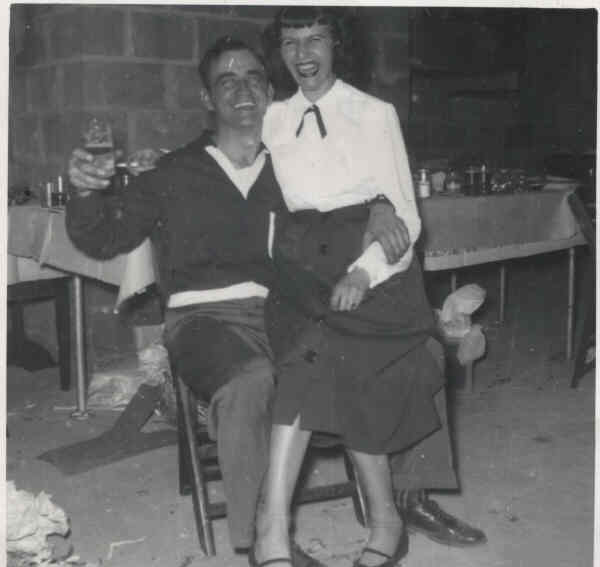 |
After the war, he would marry Elvira Gaburo in 1951 and settle at 410 Raritan Avenue in Raritan.
They would have 3 children. A son Thomas was born in 1954 and identical twin daughters Cindy and Cathy were born in 1957.
(Today they both live on Anderson Street in Raritan.)
|
| Anthony and Elvira |
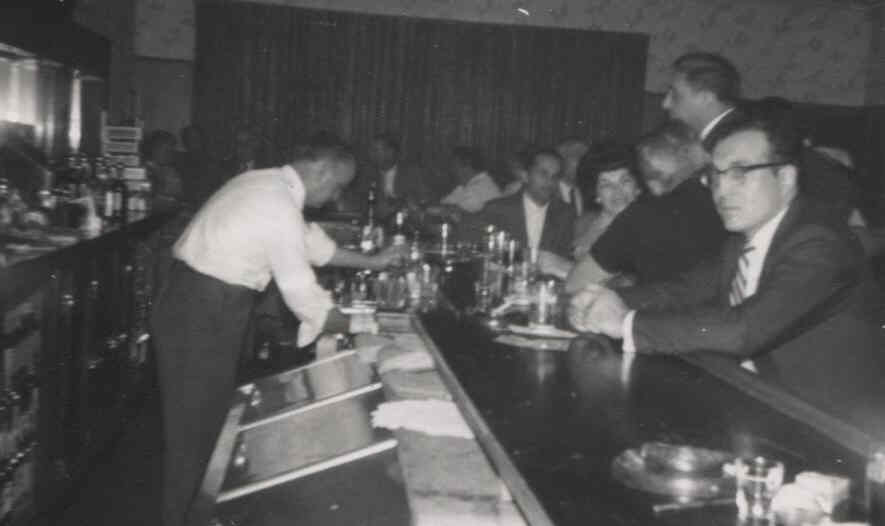 |
Anthony embarked on a lifelong career with the U.S. Postal Service working primarily at the Raritan Post Office.
Always a hard worker, for years he had a second job as a bartender. He worked locally at several places including the Centennial Tavern where he worked for Tony Orlando, the gentlemen he wrote many letters to during the war.
|
Anthony Bartending at The Centennial Tavern
(Standing is Raritan's Peter Vitelli) |



